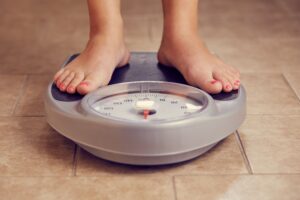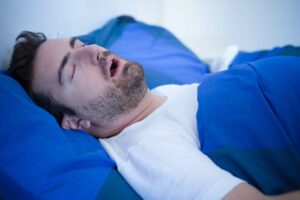
Finally, Spring has arrived in Michigan! The weather is warming and heavy coats and gloves are being shed for less layers and shorter sleeves.
Spring’s warm up allows people to get outdoors more and enjoy the fresh air and sunshine; good for both body and soul. Yet, after a year of social limitations and a long, snowy winter, wearing less attire isn’t a celebration for everyone.
Being stuck indoors, whether for pandemic precautions or due to weather, has added an uptick on bathroom scales for a number of adults. In spite of good intentions of new year’s resolutions, many are carrying an added load that makes wearing lighter clothing a dread.
Some estimates show that the average American adult gained 5 or more pounds during the pandemic. That’s weight none of us needed, especially since a risk factor of the COVID-19 virus is obesity. According to the CDC:
• Having obesity increases the risk of severe illness from COVID-19. People who are overweight may also be at increased risk.
• Having obesity may triple the risk of hospitalization due to a COVID-19 infection.
https://www.cdc.gov/obesity/data/obesity-and-covid-19.html
According to an article published in March 2021 by the New York Times, a study of weight measurements tracked by Bluetooth-connected smart scales suggests that adults under shelter-in-place orders gained more than a half of a pound every 10 days. The senior author of the research points out that equates to roughly 2 pounds per month, adding 20 pounds over the course of a year.
https://www.nytimes.com/2021/03/22/health/virus-weight-gain.html
Even before the pandemic, the American population had quite the problem with weight. In September 2020, the Centers for Disease Control & Prevention (CDC) shared alarming statistics of obesity in the U.S., with Michigan as one of 12 states with an adult obesity prevalence at or above 35%. Other states are: Alabama, Arkansas, Indiana, Kansas, Kentucky, Louisiana, Mississippi, Oklahoma, South Carolina, Tennessee, and West Virginia. (This is up from 9 states in 2018 and 6 states in 2017.) https://www.cdc.gov/obesity/data/prevalence-maps.html
With Spring and the availability of the COVID vaccine, there is optimism that a sense of normalcy and activity can return. Yet, like the struggle to stick to a new year’s resolution to lose weight, a particular factor that may be adding to the battle of the bulge can be quality of sleep.
In the midst of the added stress Americans have endured over the past year, getting a full night of restful sleep has become even more difficult than ever. Sleep problems typically decrease energy levels needed for being active. Add to this, insufficient sleep causes a reaction in the brain that revs up cravings for sweets and carbs in an effort to supply the body with quick energy.
Weight gain also adds to the propensity for sleep problems. When the neck has a heavier load, airway passages are more likely to have blockage. As muscles relax during sleep, the weight can cause obstructions to the ability to achieve full intake of oxygen.
This can lead to snoring and, eventually, culminate into full-blown obstructive sleep apnea. Obstructive sleep apnea (OSA) is a serious sleep disorder that causes pauses in breathing. Some of these pauses can last up to a minute each time and occur hundreds of times during sleep.
Although daytime fatigue and lack of energy contributes to weight gain, many health risks are associated with sleep apnea. These include…
• Stroke – Sleep apnea is more common in people who have had a stroke, with the risk for a stroke increasing by the severity of sleep apnea. Stroke is 3 times more likely in males who have moderate to severe sleep apnea.
• Heart – Sleep apnea has been shown to increase blood pressure by 37 percent. Sleep apnea increases the risk for coronary artery disease by 30 percent and cardiac arrhythmia by 54 percent. Moderate to severe sleep apnea increases the risk for congestive heart failure by 76 percent. People with sleep apnea have a 30 percent greater risk for heart disease as well as sudden death.
• Mental Well-being – Untreated sleep apnea can cause anxiety, depression, lack of motivation, reduced attention span, moodiness, and poor judgement. Daytime sleepiness leads to higher incidences of motor vehicle accidents, reduced work efficiency, impaired concentration, and slow reaction time.
• Sex Life – Sleep apnea contributes to a loss of libido (by decreasing blood flow).
• Diabetes – More than 30 percent of type 2 diabetics have sleep apnea.
Although sleep apnea sufferers are not all overweight and some do not snore, the likelihood for having sleep apnea typically involves one or the other factor, or both.
Being overweight AND having sleep apnea creates a rather vicious cycle. If you’re overweight or obese, you have a greater challenge when it comes to weight loss. Lack of restful sleep actually causes the body to rebel when you diet, making it far more challenging to lose weight.
Here’s what happens when your body fails to get adequate sleep…
Insufficient sleep causes a reaction in the brain that revs up certain food cravings. In the body’s search for energy, the sleep-deprived brain causes an imbalance of the hormones that regulate hunger and satiety (the feeling of fullness).
During REM sleep (the deep level of sleep needed), the brain is actually very active. It is during this time that the brain eliminates toxins and resets hormonal levels. Without sufficient oxygen levels during this time, the brain is less efficient in these tasks.
To overcome sluggishness during the day, the brain urges you to seek quick energy sources through cravings for sugar and carbohydrate. Added to this, the brain activates hunger urges more often and decreases your feeling of fullness. Add to this the tiredness that makes you want to crawl into bed rather than hop on a treadmill. To no surprise, the culmination is weight gain.
Trying to lose weight with your brain literally working against you is darned difficult. However, restoring restful sleep by eliminating heavy snoring and sleep apnea may be a simple fix.
As a neuromuscular dentist, I take sleep apnea very seriously. In addition to extensive training so our patients receive a proper diagnosis, we have incorporated advanced technology, which enables us to create individualized appliances, designed to achieve maximum results.
This begins with Cone Beam 3D imaging, which provides clear, concise views at the lowest radiation levels possible. In one pass around the patient, cone beam captures up to 600 images for a unique review of airway passages.
Here, oral appliances are custom-designed to the unique contours of your mouth. During sleep, they comfortably hold the lower jaw (mandibular) slightly forward to open the airway. These oral appliances are custom-contoured, small and do not interfere with sleep. They are also FDA approved and easy to clean.
Although some dentists offer oral devices as an add-on to their dental services, it’s important to know that the design and fit of these appliances can vary a great deal. Truly, this is no place for a one-size-fits-all approach.
As an experienced dentist who has made snoring and sleep apnea therapy an important part of my practice, we have helped patients enjoy a much improved quality of life. After a consultation, we feel you’ll understand the difference in our approach and why our patients have such significant success.
If you feel you suffer from sleep apnea, schedule a free consultation in our beautiful, comfortable Shelby Township dental office. During this time, I’ll explain the diagnostic process and answer your questions. Call 586-739-2155 or tap here to begin.